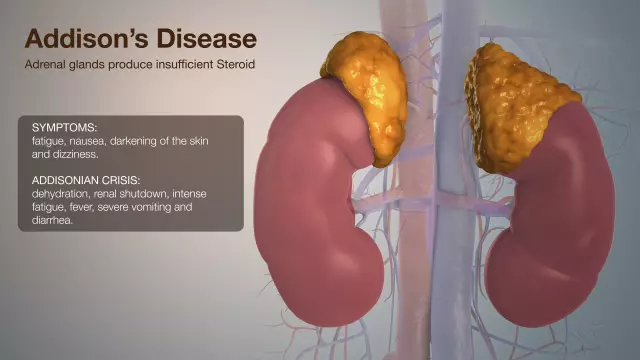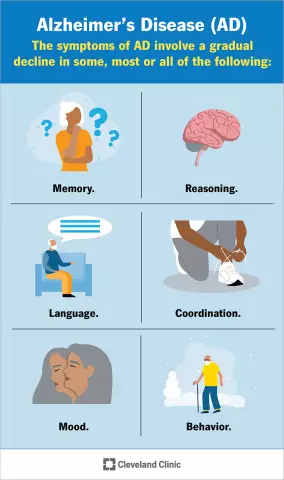- Author Rachel Wainwright wainwright@abchealthonline.com.
- Public 2023-12-15 07:39.
- Last modified 2025-11-02 20:14.
Addison's disease
The content of the article:
- Causes and risk factors
- Forms of the disease
- Symptoms
- Diagnostics
- Treatment
- Possible complications and consequences
- Forecast
- Prevention

Addison's disease (hypocorticism, bronze disease) is a rare disease of the endocrine system in which the secretion of hormones (primarily cortisol) by the adrenal cortex decreases.
The disease was first described in 1855 by the British physician Thomas Addison. It affects men and women with equal frequency; more often diagnosed in young and middle-aged people.
Causes and risk factors
The development of Addison's disease leads to damage to cells of the adrenal cortex or pituitary gland, caused by various pathological conditions and diseases:
- autoimmune damage to the adrenal cortex;
- adrenal tuberculosis;
- removal of the adrenal glands;
- hemorrhages in the adrenal tissue;
- adrenoleukodystrophy;
- sarcoidosis;
- long-term hormone replacement therapy;
- fungal infections;
- syphilis;
- amyloidosis;
- AIDS;
- tumors;
- irradiation.

A kidney tumor can lead to damage to the cells of the adrenal cortex and, as a result, Addison's disease
In about 70% of cases, Addison's disease is caused by an autoimmune adrenal cortex. For various reasons, the immune system malfunctions, and it begins to recognize the adrenal cells as foreign. As a result, antibodies are produced that attack and damage the adrenal cortex.
Addison's syndrome is accompanied by a number of hereditary pathologies.
Forms of the disease
Depending on the cause, Addison's disease is:
- Primary. It is caused by insufficient functioning or damage to the adrenal cortex itself.
- Secondary. The anterior pituitary gland secretes an insufficient amount of adrenocorticotropic hormone, which leads to a decrease in the secretion of hormones by the adrenal cortex.
- Iatrogenic. Long-term use of corticosteroid drugs leads to adrenal atrophy, in addition, disrupts the connection between the hypothalamus, pituitary gland and adrenal glands.

Forms of Addison's disease
Symptoms
Addison's disease has the following manifestations:
- darkening of the skin and mucous membranes;
- muscle weakness;
- hypotension;
- orthostatic collapses (a sharp decrease in blood pressure when changing position);
- decreased appetite, weight loss;
- craving for sour and (or) salty foods;
- increased thirst;
- abdominal pain, nausea, vomiting, diarrhea;
- dysphagia;
- tremor of the hands and head;
- paresthesia of the limbs;
- tetany;
- polyuria (increased urine output), dehydration, hypovolemia;
- tachycardia;
- irritability, irascibility, depression;
- sexual dysfunction (cessation of menstruation in women, impotence in men).
In the blood, a decrease in glucose levels and eosinophilia are determined.

External manifestations of Addison's disease
The clinical picture develops slowly. For many years, the symptoms are mild and may remain unrecognized, attracting attention only when an addison crisis occurs against the background of stress or some other disease. This is an acute condition characterized by:
- a sharp drop in blood pressure;
- vomiting, diarrhea;
- sudden sharp pain in the abdomen, lower back and lower limbs;
- confusion or acute psychosis;
- fainting due to a sharp drop in blood pressure.
With an Addison crisis, a pronounced electrolyte imbalance occurs, in which the sodium content in the blood decreases significantly, and phosphorus, calcium and potassium increases. The glucose level also drops sharply.
Diagnostics
The diagnosis is suggested based on the study of the clinical picture. To confirm it, a number of laboratory tests are carried out:
- stimulation test with ACTH;
- determination of the level of ACTH in the blood;
- determination of the level of cortisol in the blood;
- determination of the level of electrolytes in the blood.

To diagnose Addison's disease, the level of ACTH in the blood is determined
Treatment
The main treatment for Addison's disease is lifelong hormone replacement therapy, that is, taking medications that replace the hormones produced by the adrenal cortex.
To prevent the development of an Addison crisis against the background of an infectious disease, trauma or impending surgery, the dosage of hormonal drugs should be reviewed by an endocrinologist.

Life-long hormone replacement therapy is indicated for Addison's disease
In the case of an Addison crisis, the patient needs emergency hospitalization in the endocrinology department, and in serious condition - in the intensive care unit. The crisis is arrested by injecting adrenal cortex hormones intravenously. In addition, the existing violations of the water-electrolyte balance and hypoglycemia are being corrected.
Possible complications and consequences
The most dangerous complication of Addison's disease is the development of the Addison crisis, a life-threatening condition.
The reasons for its occurrence can be:
- stress (surgery, emotional stress, trauma, acute infectious diseases);
- removal of both adrenal glands without adequate hormone replacement therapy;
- bilateral thrombosis of the adrenal veins;
- bilateral embolism of the adrenal arteries;
- bilateral hemorrhage in adrenal tissue.
Forecast
The prognosis for Addison's disease is good. With adequate hormone replacement therapy, the life expectancy of patients is the same as for people without this disease.
Prevention
Prevention measures for Addison's disease include the prevention of all those conditions that lead to its development. There are no specific preventive measures.
YouTube video related to the article:

Elena Minkina Doctor anesthesiologist-resuscitator About the author
Education: graduated from the Tashkent State Medical Institute, specializing in general medicine in 1991. Repeatedly passed refresher courses.
Work experience: anesthesiologist-resuscitator of the city maternity complex, resuscitator of the hemodialysis department.
The information is generalized and provided for informational purposes only. At the first sign of illness, see your doctor. Self-medication is hazardous to health!






